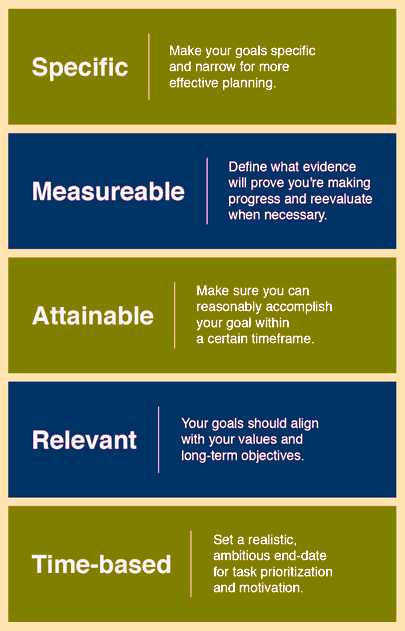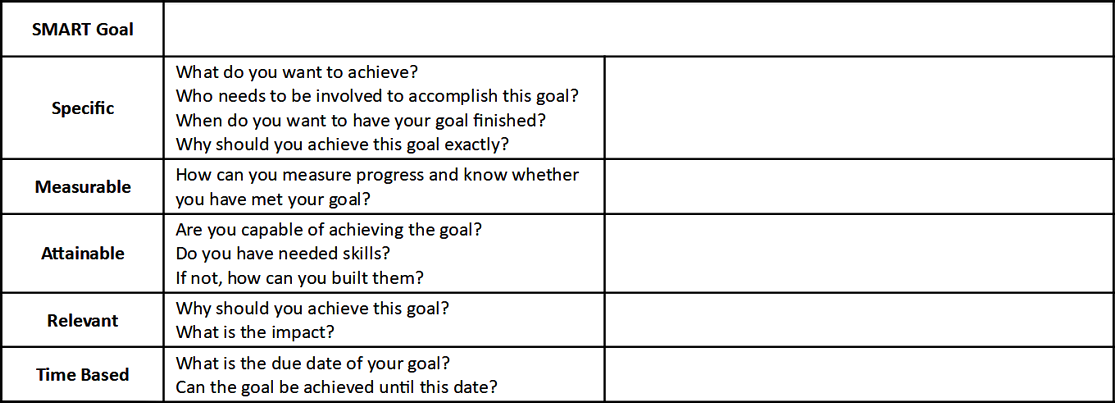SMART Goals
TL;DR
SMART Goals is a tool that can be used to plan and achieve your goals – both personal and work ones. This tool helps you to make your goals achievable by assessing whether they are Specific, Measurable, Attainable, Relevant, and Time-bound.
 Source: SMART goals summary (author)
Source: SMART goals summary (author)
What Are SMART Goals?
SMART is an acronym that you can use to guide your goal setting. Using SMART Goals sets boundaries and defines the steps you will need to take, resources necessary to get there, and milestones that indicate progress along the way. To make sure your goals are clear and reachable, each one should be:
- Specific (simple, sensible, significant).
- Measurable (meaningful, motivating).
- Attainable (agreed, achievable).
- Relevant (reasonable, realistic and resourced, results-based).
- Time-bound (time-based, time-limited, time/cost limited, timely, time-sensitive).
How to Implement SMART Goals
Specific
Specify your goal to be able to focus your efforts. The following questions can help you:
- What do I want to accomplish?
- Why is this goal important?
- Who is involved?
- Where is it located?
- Which resources or limits are involved?
Measurable
With measurable goals set, you can track your progress and stay motivated. Clearly set deadlines will help you to assess your progress. A measurable goal should address questions such as:
- How much?
- How many?
- How will I know when it is accomplished?
Attainable
Your goal also needs to be realistic and attainable to be successful. When you set an achievable goal, you may be able to identify previously overlooked opportunities or resources that can bring you closer to it. To set an attainable goal, you will have to deal with the following questions:
- How can I accomplish this goal?
- How realistic is the goal, based on other constraints, such as financial factors?
NOTE: Do not set goals that depend on someone else. Only goals that depend on you, your effort, and your skills are convenient ones.
Relevant
Ensure that your goal matters to you, and is not in conflict with your other relevant goals. So, make sure that your plans drive everyone forward, but that you're still responsible for achieving your own goal. In order to set a relevant goal, answer these questions (answers should be “Yes”):
- Does this seem worthwhile?
- Is this the right time?
- Does this match my other efforts?
- Am I the right person to reach this goal?
- Is it applicable in the current (socio-)economic environment?
Time-bound
What is your goal time-frame? An end-date can provide motivation and help you to prioritize and prevent everyday tasks from taking priority over your longer-term goals. To set a time-bound goal, you will deal with the following questions:
- When?
- What can I do six months from now?
- What can I do six weeks from now?
- What can I do today?
What SMART Goals Cannot Solve
- goals that do not allow definition of a clear result
- goals whose progress cannot be measured
- goals whose achieving depends on circumstances that you cannot affect
- etc.
For example, it will be very difficult (or impossible) to define a clear result and relevant metrics for problems like Not my problem mentality.

There are various SMART Goals worksheets, templates, and maps that can help you with the goals setting process – for example Smartsheet.
Problems That SMART Goals Can Solve
SMART Goals can be used for problems that you are able to define fully following SMART Goals methodology carefully.
Examples:
SMART Goals Pitfalls
Focus is Too Narrow
Fixating on a single SMART goal without the appropriate context, it is easy to fall into the trap of seeing it as the only goal.
Measuring Success and Failure
When success is measured by a SMART goal, people may end up pursuing that goal for a narrowly defined success, and letting that exclusive target take over their identity.
Short-term Result vs. Long-term Success
Preferring short-term results to overall success can represent a risk of missing your goal.
Giving Up Too Soon, and All-or-nothing Approach
SMART goals are viewed as complete entities, and when you are unable to do everything as planned, you may become discouraged and give up the entire goal.
Failing to Realize One's Full Potential
Setting goals that are too easy will not move you to achieve more than your minimum potential; so could you miss the opportunity for growth.
“Realistic” and “Achievable” Can Be Misleading
Ask yourself not only whether your goal is realistic considering your capability but also whether it is realistic considering all your other goals. Do not overload yourself with too many high priorities.
Missing Crucial Step Along the Way
Be aware of setting a clear first step and final result but not knowing how you are going to get from A to B.
Resources for SMART Goals
Want to write for DXKB?
Feel free to contribute. People from DXKB community will be more than happy.
Related articles
ALL ARTICLES
ALL ARTICLES